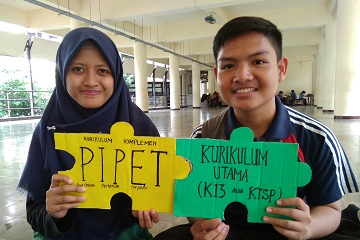IPB Students Proposes PIPET Curriculum as Zero Hunger Solution

In the year 2030, Indonesia is projected to face demographic bonus. This can become a threat for Indonesia if 67% of its young generation in productive age does not understand how to manage its agricultural sector. The biggest threat for this is massive hunger.
To overcome this problem, students of Faculty of Agriculture, Bogor Agricultural University (IPB), proposed the concept of Integrated Agricultural Education (PIPET). PIPET served as a form of implementation of Sustainable Development Goals (SDGs) 2030 vision, which is zero hunger. These students are Mar'ie Muhammad and Seliawati Dwiagustin. They got the first prize in Agroteknologi Festival Paper Competition (Agrofest), which was held in Bangka Belitung University on May 6th until May 10th 2018.
Mar'ie explained that the concept of PIPET is to instill the love of agriculture and to enhance young generations' competency in managing the agricultural sectors in their respective regions.
"The concept of PIPET is wide and integrated agricultural education. It encompasses agriculture, fisheries, animal sciences, forestry, and agrotourism. This concept is integrated into the form of complementary curriculum that will introduce and develop local and national potential," said Mar'ie.
PIPET is an integrated school of agriculture that will be implemented in every level of education, from elementary school, junior high school, until high school. It will also serve as a prerequisite to enter the next step of education. PIPET as the complementary curriculum was designed to complete the existing curriculum in schools, for example, it could be synergized into Curriculum 2013, especially in art and culture subject. If the curriculum still followed Kurikulum Tingkat Satuan Pendidikan (KTSP), PIPET can be integrated to local subject (muatan lokal).
"In Elementary School, students will be introduced to local agriculture potential and they also will be given an agrotourism activity to their respective regions. In Junior High School, students will be trained to analyze local potentials that have not been utilized, and also the how to cultivate the potentials. As for High School students, they will enter the agribusiness stage. So they will finally understand how to add value to agricultural products and to brand local potentials," said Mar'ie.
The concept of PIPET has its excellence, as PIPET can develop the love of agriculture since an early age and it is always continuing in every level of education systematically. Students can also understand the potentials of their respective regions. They will also develop their soft skills in agricultural sector as a preparation for their post-campus life. Therefore, the full support from government and local state universities in respective regions are really needed.
"We are really expecting awareness and support from the government to actually execute this PIPET curriculum in Indonesia as an effort to prepare for a demographic bonus in 2030. Aside from that, we hope that high school students can be motivated to continue their studies in agricultural field, so when they finished their studies, they can go back to their local regions to develop the potentials," Mar'ie hoped. (CN)



